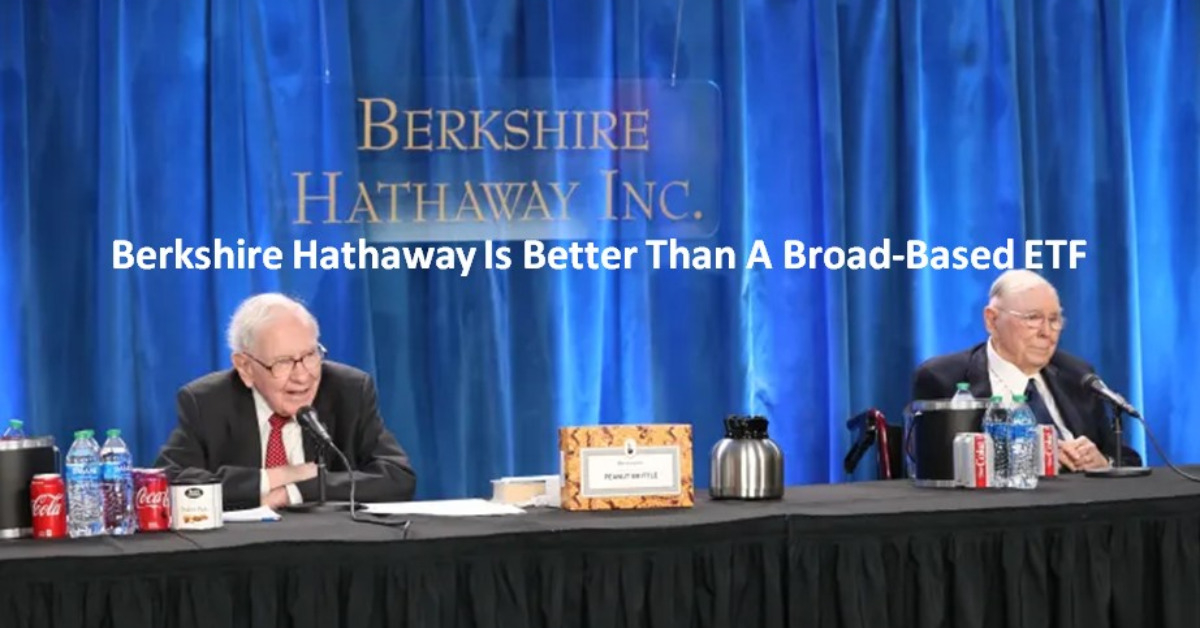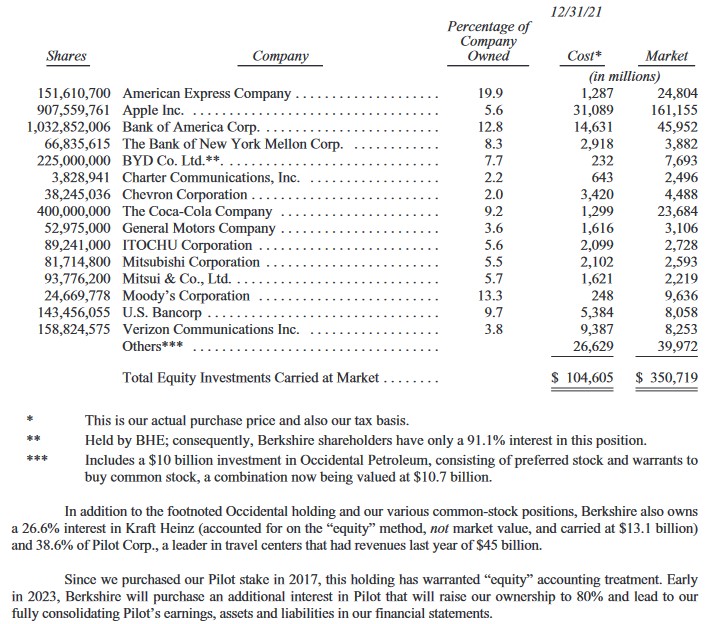
In my opinion, Berkshire Hathaway (BRK-a and BRK-b) is better than a broad-based ETF for various reasons.
I last wrote about BRK in this June 14, 2021 post. However, I periodically increase BRK-b exposure in various accounts; I acquired shares @ $320.35 for a young investor’s account on May 4, 2022.
In my June 14, 2021 post, I mention that ‘keeping it simple’ is a consideration when investing. This is exceptionally important when an investor has:
- limited investment knowledge;
- no interest in analyzing companies; and
- a very long investment time horizon.
What I like about a BRK is:
- exposure to several publicly traded and privately held companies;
- a very low-cost structure. There are no ongoing fees as with mutual funds and Exchange Traded Funds (ETFs);
- exceptionally low credit risk; and
- sound investment decisions made by a team of highly successful investors.
Business Overview
BRK is a holding company that owns subsidiaries engaged in a large number of diverse business activities. The most important of these are primary and reinsurance businesses, a freight rail transportation business (BNSF Railway), and a group of utility and energy generation and distribution businesses. It also owns and operates numerous other businesses engaged in a variety of activities.
The best way to learn about BRK is to read the Chairman’s Letter to Shareholders and Part 1 starting on page 16 of 143 of the 2021 Form 10-K. Both are accessible here. The Vice-Chairman of BRK’s Non-Insurance Operations Letter to Shareholders is also a valuable read. This 2-page letter starts on page 137 of 143 in the 2021 Form 10-K.
Diversification
Investors are likely familiar with BRK’s largest investments it does not control.
BRK’s filings with the US Securities and Exchange Commission are accessible here. The Form 13F-HR filings are quarterly reports filed by institutional managers in which holdings are listed.
BRK has received special dispensation to file this report later than mandated because investors used to make investment decisions based on its quarterly filings. This created problems for BRK when it was trying to accumulate or reduce exposure to certain publicly traded companies. Investors still look at these quarterly reports but by the time this information is publicly available, much could have changed.
In addition to exposure to several publicly traded companies, BRK also owns companies outright. A list of Operating Companies as of December 31, 2021 commences on page 140 of 143 in the 2021 Form 10-K. Several of these companies are well-known (eg. BNSF Railway, Dairy Queen, Benjamin Moore).
While a broad-based ETF, such as BlackRock’s iShares Core S&P 500 ETF, provides an investor with diversification to 500 companies at a very low cost, no investment analysis is undertaken to determine the composition of the ETF; exposure to the holdings within the ETF is based on a company’s market cap. Looking through the holdings within this ETF, we see companies whose domestic unsecured debt is not investment grade. Common equity investors assume the highest level of risk. I, and these young investors, have no desire to take on such risk.
Financials
Q1 2022
BRK’s Q1 2022 Form 10-Q is accessible here and its Earnings Release is accessible here.
The Q1 2022 Consolidated Statement of Cash Flows discloses ~$51B of securities purchases. The Consolidated Balance Sheet shows a ~$40.5B drop in cash and cash equivalents and short-term investments in U.S. Treasury Bills; the balance of these line items amounts to ~$106.2B.
At the end of Q1, it held ~$390.5B of investments in equity securities, up from ~$350.7B at FYE2021. Its investment in equity securities is more than half of the company’s current $722B market cap.
Included within the ~$51B in securities purchases is a large stake in Chevron. This stake grew to $25.9B as of March 31 from just $4.5B three months earlier.
BRK also acquired more than $6B of stock in Occidental Petroleum, a company in which it already held $10B of preferred stock.
In addition, BRK acquired ~$4.2B of HP Inc stock.
On March 21, 2022, BRK announced its intent to acquire insurance company, Alleghany Corp, for $11.6B.
First-quarter operating profit edged up to $7.04B from $7.018B in Q1 2021.
Net earnings attributable to BRK shareholders, however, fell ~53.4% to $5.46B from $11.71B in Q1 2021. Net results included $1.58B of gains and losses from stocks including Apple as well as Chevron.
An accounting rule requires BRK to report unrealized gains and losses (a ~$5.21B gain in Q1 2021 and a ~$1.74B loss in Q1 2022). Buffett often urges investors to ignore such gains and losses.
The reason unrealized gains and losses must be reported is that a GAAP rule imposed in 2018 requires a company holding equity securities to include in earnings the net change in the unrealized gains and losses of those securities. These unrealized gains and losses are paper losses and not actual realized gains and losses that come from the sales of the securities.
Because of the accounting rule change, BRK’s reported net earnings have become significantly more volatile because of fluctuations in the stock market and not because of major shifts in the company’s operations.
FY2022 Guidance
BRK’s management does not provide guidance.
Credit Ratings
In my The Importance Of Margin Of Safety post, I state that every investment carries a degree of risk. It is up to the investor to determine if the potential investment return outweighs the potential risks.
BRK is a conglomerate overseen by a small group of highly sophisticated investors who properly assess risk/reward!
BRK’s unsecured long-term debt credit ratings are unchanged from my last review.
- Moody’s: assigns an Aa2 rating.
- S&P Global assigns an AA rating.
- Fitch assigns an AA- rating; this rating is one notch lower than that assigned by Moody’s and S&P.
All 3 ratings are high-grade investment-grade credit ratings and define BRK as having a VERY STRONG capacity to meet its financial commitments. It differs from the highest-rated obligors (AAA) only to a small degree.
Dividends and Share Repurchases
Dividend and Dividend Yield
BRK does not distribute a dividend.
Share Repurchases
BRK’s common stock repurchase program permits it to repurchase its Class A and Class B shares any time that Warren Buffett, Chairman of the Board and Chief Executive Officer, and Charlie Munger, Vice Chairman of the Board, believe that the repurchase price is below the company’s intrinsic value, conservatively determined. The program continues to allow share repurchases in the open market or through privately negotiated transactions and does not specify a maximum number of shares to be repurchased. However, repurchases will not be made if they would reduce the total value of BRK’s consolidated cash, cash equivalents and U.S. Treasury Bills holdings below $30B. The repurchase program does not obligate BRK to repurchase any specific dollar amount or number of Class A or Class B shares and there is no expiration date to the program.
For many years, BRK never repurchased shares. In FY2018, however, BRK embarked on a repurchase program. The ramp-up in share repurchases is because management felt BRK was undervalued at a time when other companies were grossly overvalued.
- FY2018 – $1.346B
- FY2019 – $4.85B
- FY2020 – $24.706B
- FY2021 – $27.061B
- Q1 FY2022 – $3.18B but none in the first 3 weeks of April
Valuation
I pay almost no attention to BRK’s valuation for reasons explained in Warren Buffett’s FY2020 Letter to Shareholders (starts on page 5 of 148).
Final Thoughts
My final thoughts are unchanged from those in my June 14, 2021 post.
I remain confident in BRK’s ability to continue to reward long-term shareholders. The plan is to continue to add to our BRK exposure.
I wish you much success on your journey to financial freedom!
Note: Please send any feedback, corrections, or questions to finfreejourney@gmail.com.
Disclosure: I am long BRK-b.
Disclaimer: I do not know your circumstances and am not providing individualized advice or recommendations. I encourage you not to make any investment decisions without conducting your research and due diligence. You should also consult your financial advisor about your specific situation.
I wrote this article myself and it expresses my own opinions. I am not receiving compensation for it and have no business relationship with any company whose stock is mentioned in this article.


